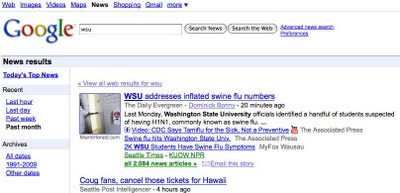1. Throughout the semester, we’ve looked at several different examples of tools, technologies and techniques for storytelling on the Web. Use this knowledge to construct a brief analysis of how SpokesmanReview.com, which is the Web site for Spokane’s print newspaper The Spokesman-Review, is staying competitive through use of “Web 2.0” technologies.
Specifically:
a. What specific Web 2.o technologies are already in place on this site and how are they being used?
The Spokesman-Review’s overhaul of their site and addition of more Web 2.0 friendly features make their Web site well formatted for the changing news industry. With the advent of the Internet people are becoming more savvy when it comes to getting their information. They do not want to be slowed down by massive walls of text or ascetically displeasing designs. Consumers want images, graphics, slide shows, blogs, video, audio and color.
Gone are the days of the 24-hour-news cycle. People want to know as soon as news happens. Not the next morning. Therefore, it is imperative to implement new technologies and storytelling techniques as quickly as humanly possible.
The SR is doing this by getting their new mediums on their Web site and featuring them in prominent, visually appealing ways. For instance, today’s front page of their site features one dominant news story accompanied by a photo. The rest of the stories are listed next to the featured story but below that are links to two videos and a slide show as well as all their Web 2.0 media.
Now this leaves the option for the traditional reader to see their traditional content but it does not make the assumption that everyone is a traditional reader. They realize that people would rather see photos of a bull fight than read words describing the event.
Looking at their front Web page as an indicator of what they view as the most important content one can tell that they realize that their multimedia capabilities are more important than even their local news coverage. That is smart.
b. How does embracing Web 2.o tactics help the site/paper stay competitive?
As I mentioned before, the bar has been set. The 24-hour news cycle is the standard and papers need to think along those lines. Competition against other papers should be the least of their worries. Now, papers are forced to compete against TV news, radio, other papers, citizen journalists, bloggers and even people in the right place at the right time. Anyone with a cell phone camera is a potential competitor. YouTube, Blogger and Twitter has leveled the playing field. Anyone can publish instantaneously for little or no cost.
The key to maintaining marketplace dominance is quality. Content is still king and those that forget this will find that they are simply being ignored by consumers. That means newspapers need to realize that quality content will not cut it. They will need flash, packaging and brand management to stay afloat. We are not just selling the news. We are selling ourselves.
Internet giants like Arianna Huffington and Matt Drudge know this.
c. What other things can/should the site/paper be doing? Why?
Promoting interactivity through reader participation.
It is dangerous for newspapers that anyone with a cell phone can be a potential journalist. However, that can work to their advantage. The Iranian elections showed us how effective social networking sites like Twitter can really be. They can turn the tide of global opinion and make anyone a foreign correspondent.
Papers do not realize that, if managed properly, their readership base can actually aid in the news gathering process.
Who better to take a picture of a train wreck that the man sitting at the railroad crossing as it happens?
That is what social media offers to newspapers. Better to have a thousand eyes in a thousand places …
2. News, opinion and information blogs are gaining in popularity among Web users. However, these “new influencer” forms of media present some threats to mainstream, traditional news outlets. For example, earlier this year, the century-old Seattle P.I. closed its entire print operations and streamlined to become an online-only offering.
a. Should mainstream, traditional news outlets be concerned about the rise of blogs? Why or why not?
Yes. Once someone figures out how to bring all the best and freshest content found on blogs, filter it and roll it all into something convenient for the American consumer to consume, you have found the alchemist’s stone of modern communications.
The problem, of course, is filtering. But that’s the beauty and challenge of the Internet. There’s something for everyone and there’s always something interesting never before seen.
Google is trying. The Wave for example. Or the Google Reader. Or the generic dashboard, RSS feed or bookmarks.
But Twitter has come the closest so far. It’s global but not limited by the user’s personal knowledge of his or her contacts like Facebook or MySpace. It’s content driven, meaning: people seek each other out because of the content generated by one user or another.
It’s not about memories or shared experiences. And that’s why is perfectly suited for blogs.
Twitter levels the global playingfield and maximizes the Internet’s potential to become the great equalizer by operating purely in the marketplace of ideas. A.k.a. It’s what you say not who you are, what you look like, or what school you have been to.
Exhibit A: Joe the Plumer.
The fickle whims of the American people reached out to him after he popped up on … The Internet. No way a television producer would give that guy five seconds on air to ask presidential candidates questions. But you have someone who does not realize the awesome power of the Internet and thinks they can take questions from YouTube in a debate and a year later you have a worldwide phenomenon.
There’s a saying: “God didn’t make men equal, Sam Colt did.” I amend that. I say: God didn’t make men equal, the Internet did.
So my answer is yes. Papers should definitely be concerned about the rise of the blog. It’s just another way that people will realize they don’t need things synthesized anymore. There’s no limit to communication. Newspapers will be swallowed.
b. What influence, if any, does the rise of blogging have on the “traditional” news paradigm (i.e. where there is a large news department that adheres to strict ethical and news evaluation standards)?
It’s already changed the “traditional” news paradigm. It’s the Wild West. The implications that the Internet poses are myriad. Blogs are like FUBU: For Us, By Us.
Why get your news from an annoying suit with a pasted on smile who wasn’t even there? Why not look up a blog that has raw footage of the event uploaded by a blogger?
Anyone can have a blog about anything. The bar for ethics on the Internet is set by the lowest common denominator. There’s is no incentive. Is a citizen blogger going to be fired from wordpress if he behaves unethically?
Just like the rest of life it is up to the individual to act ethically. So alas, only a tiny minority of people will, in reality, act ethically.
c. What can traditional media outlets do to stay relevant as the media landscape changes without compromising their ethics and integrity? Cite specific examples, if applicable.
Use blogs to their advantage. Like this. It relatively easy to maintain institutional control. People can tell the difference between crazy people’s electronic raving and rational “traditional news and opinion” content.
3. For this question, I would like you to briefly look over these four news/information sites:
Digg, The Drudge Report, Google News, and Wiki News
a. What do Digg and Wiki News have in common?
They are both user driven. That is … they are real news sources but they rely completely or heavily on user contributed content by use of various means. But real I mean they exist, people read them, use them and they are successful. I do not make any claim that they are ethical endeavors. However, they are effective.
b. How are they different from The Drudge Report?
The Drudge Report has some kind of editorial control over it’s content. Matt Drudge’s name is attached to that Web site. It’s legitimate and well known. Therefore someone has something to lose. I.e. reputation, money, by behaving too badly. In other words, Drudge cannot rely on the anonymity of the masses to cover his mistakes.
c. What is unique about Google News?
The “3 digit rule” and the way they use crawlers to determine what is and isn’t news. The thing about Google is that it’s powerful enough to say what the difference is for a lot of people. Google has branded itself effectively enough to say what is newsworthy. According to their method.
d. All of the above sites deviate from the traditional news gathering and distribution models. Explain the pros and cons of this shift in the news business.
As always, what’s a pro for one is a con for another. If you have something to lose from the media (and life) becoming digitized then you are out of luck. If you have something to gain from the Internet and all the things that come flowing forth from that digital delta then you are in luck.
The downside is that people will become so fractioned in their information gathering and it could increase to a point where the lines between propaganda and truth become so blurred that people won’t know who to trust.
But with the advanced technologies of today that is doubtful. On the Internet one can always say “prove it” on the Internet.
With this shift different people stand to make money than the ones who are currently making money. The fact is that good reporting is always good reporting and tripe is always tripe. It doesn’t matter if it’s the National Enquirer or TMZ.com people know there’s nothing there or real value. The same goes for the New York Times and Politico.com, people know they have credibility.
The burden will be, now more than ever, shouldered by the people. Now we will see if the American consumer really is the slobbering, fat, mindless pig that he and she is portrayed to be or (more likely) market trends will reflect a people who vary greatly from one another and remain unpredictable in their habits and interests. That is the more rational, real world answer. In short: people are people. Sometimes they just like certain things not because it was always needed but because it just came along at the right time.
Exhibits B, C and D: Billy Ray Cyrus, piano key neckties and fondue.


